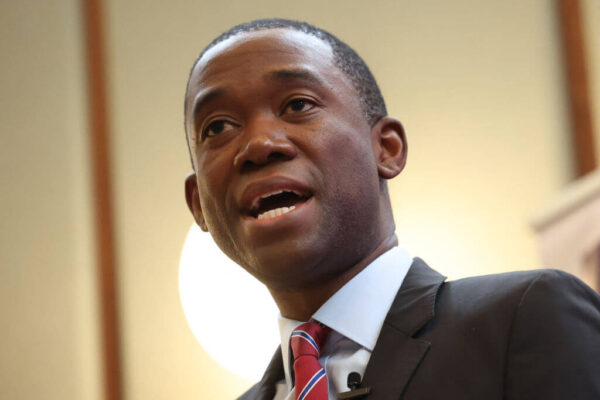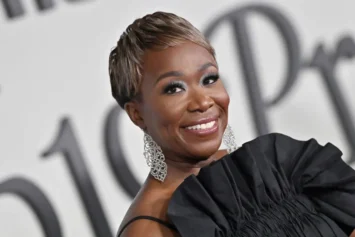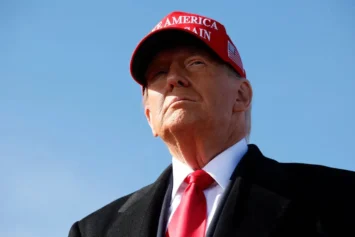As the election cycle deepens and Americans tighten their pockets due to financial strain, U.S. Deputy Secretary of the Treasury Wally Adeyemo will travel to Atlanta on Thursday to shed light on Joe Biden’s economic investments in Black communities.
Adeyemo spoke with Atlanta Black Star on Tuesday ahead of his trip to the metropolitan area, known for being the country’s Black mecca for professionals and creatives, in an exclusive interview. ABS asked the leading economist to assess the department’s successes and the administration’s plans to tackle lingering issues.

The following one-on-one conversation has been condensed and edited.
Atlanta Black Star: What has been the administration’s most successful initiative aimed at helping Black people?
Wally Adeyemo: The core of every Black household is what we can do to advance the lives of our children. I think that one of the most significant things that the president pushed for was the Advance Child Tax Credit, which was money during the pandemic to go to parents to help them provide for their children.
Note: US Census data shows that the poverty rate among Black children in 2022 was at 22.3 percent, a decline from 2021 when it was 25.9 percent. Last year’s data will likely be published in September 2024.
I think the second thing that we’ve been really impressed by is the historic number of Black Americans who have started their own small businesses. The Biden administration has provided $1.4 billion to Black-owned banks in this country to help make loans and give capital and other kinds of financing to businesses in the Black community.
In addition to those programs, we’ve done everything from providing rental assistance to Americans during the pandemic, which disproportionately helped a number of Black Americans stay in their home during this challenging period. Because of the various things that we’ve done, that led us to go from a place where Black unemployment was nearly at 16 percent during the pandemic and reached historic lows during this recovery because of the efforts that we put in place, we know that there’s more that we need to do.
Note: The jobless rate among Black Americans in January was 5.8 percent.
Atlanta Black Star: How would you describe the country’s current economic status?
Wally Adeyemo: We’ve made a lot of progress coming out of the pandemic. But we’ve got more to do, and I think the signs of progress are from everything to when you get in your car to go to the gas station today. The price of gas is down $1.90 from its peak in the summer of 2022. Because of their actions, the president took, for example, we have a strategic petroleum reserve. The president decided to release over 180 billion barrels from that reserve in order to help increase the supply of oil, which would lead to lower gas prices.
Note: The national average price for a gallon of regular unleaded gas as of Feb. 14 is $3.25. The highest price on record for regular gas was $5 a gallon on June 14, 2022.
We’re making progress in terms of seeing inflation come down and bringing costs down with things like cutting the cost of insulin down to $35 for people on Medicare.
Note: The price per unit for insulin dropped by 10.6 percent from January 2020 to July 2023, according to GoodRx.
Atlanta Black Star: How do you see the economy evolving in the next two years?
Wally Adeyemo: We’re gonna face choices in terms of what we do in terms of economic policy. There are some people out there who want to give tax cuts to the wealthy and multinational corporations in the hopes that that’s the best way to grow our economy.
The president and secretary have a very different vision. Their view is that we should provide tax relief to families with children in the form of continuing Advance Child Tax Credit and that we should make investments in communities that have lacked investments for too long, including in the Black community, because by investing in that community and giving Black Americans the ability to work in any field that they want. We have the ability to allow them to fully contribute to growing our economy as well.
So I think over the course of the next two years if we make those choices and we’re able to implement the historic legislation the president passed in terms of the Inflation Reduction Act, which is meant to bring down costs while making investments in things like technology, and the infrastructure bill, that’s going to mean that we can rebuild our roads and bridges, but also make sure that Black and brown families have access to high-quality internet, and also the CHIP and Science Act. We’re going to be in a place where we can grow an economy that works for everyone.
Atlanta Black Star: What do you see as the biggest gap or opportunity for the administration to offer support?
The most important thing that we can do is continue to work to advance legislation. That does two things: one that provides the Advance Child Tax Credit, which will help dramatically reduce child poverty for Black children in this country and provide relief to parents, but to get legislation passed that gives us more tools to be able to bring down the cost of housing, because I know that affordable housing is critical to Black Americans all over the country in rural and urban communities.
The House has passed a bipartisan piece of legislation that includes more money for the Low Income Housing Tax Credit, which we administer here at Treasury. We’re advocating for that bill to pass through the Senate because it includes not only low-income housing tax credit money that will help build more housing in the country but also includes more money for the Child Tax Credit, which will again help parents be able to support our children.
The deputy secretary will kick off his tour by hosting a roundtable at a Cobb County workforce development center with U.S. Senator Jon Ossoff on Thursday morning. In the afternoon, he will participate in a fireside conversation at Spelman College co-hosted by the Black Economic Alliance entitled “A Conversation on Building Black Wealth & The Growth of the U.S. Economy,” followed by a roundtable conversation with corporate and philanthropic partners on public-private partnerships.


